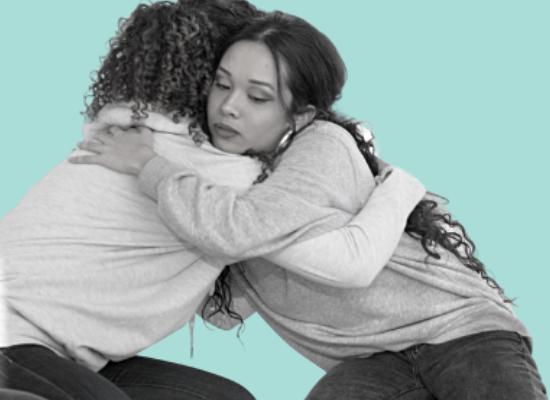
Stephanie Hepburn is a writer in New Orleans. She is the editor in chief of #CrisisTalk. You can reach her at .
Nineteen years ago, Judge Steven Leifman had an experience that forever altered his perception of mental health. He was asked to speak with a couple desperate to discuss a case listed on his docket. At the time, Judge Leifman was handling jail misdemeanor cases in Miami-Dade County, Florida, and the couple’s son, charged with possession of a shopping cart, was being held in jail. Judge Leifman says there are three kinds of people who remain in jail until their case is heard: those who have an attached felony, those who can’t afford to bond out, or those experiencing a mental health crisis and don’t know how to get out. The couple said their son was the latter. He had recently developed late-onset Schizophrenia and, experiencing religious ideation, cashed in his life insurance policy and flew to Israel. A few weeks later, he was deported back to Miami because, according to his parents, he was walking around nude in the Orthodox sections of Jerusalem. His parents begged Judge Leifman to help their son. He said he would. “When you’re young and a judge, you think you have more power and wisdom than you do. At the time, judges in Florida had no training on mental health, but I assumed there was some kind of mental health system people filtered into when arrested.” As they left Judge Leifman’s chambers, the mother turned around and said, “By the way, my son probably knows more about the mental health system than you do.” Caught off guard, Judge Leifman, said, “Excuse me?” She informed him that her son was the former head of Psychiatry at Jackson Memorial Hospital.
In the courtroom, the couple’s son was coherent, kind, and thoughtful when he appeared before Judge Leifman. It was all going well until something the judge said triggered a psychotic outburst, and the man began yelling that his real parents died in the Holocaust and the other people in the courtroom were from the CIA and there to kill him. Concerned, Judge Leifman ordered a psychiatric evaluation. Much to the judge’s dismay, the man spent another 8-10 weeks in jail, and while all three evaluators found that he met criteria for involuntary commitment, Judge Leifman didn’t have the authority to sign off on it. “Because I’m a county court judge, I couldn’t commit him, so I had to release him back to the streets while he was psychotic. I was upset about it. You don’t become a judge to be part of that kind of problem.” It was this devastating and powerless moment that sparked Judge Leifman to research what he could do to divert people with mental illness from jails into community-based treatment and support services. Fortuitously, the GAINS Center for Behavioral Health and Justice Transformation held their national meeting in Miami that same year. “I begged the center to help us, and they gave us their last grant. We had a 2-day summit with GAINS Center experts, mapping out how the criminal justice system intersected with the community mental health system. The findings were that it was embarrassingly dysfunctional.”
Pre- and Post-arrest Diversion System
Judge Leifman established the Eleventh Judicial Circuit Criminal Mental Health Project (CMHP) in 2000, developing a two-part system: a pre- and post-arrest diversion system for Miami-Dade, a large county of almost 3 million people with 36 police departments. He says his team realized if they were going to get a handle on the situation, they had to first reduce the number of people with Serious Mental Illness (SMI) from entering the criminal justice system. “We looked around, and the Memphis Crisis Intervention Team (CIT) police program seemed by far the best. Over time, we’ve been able to get all of our law enforcement agencies on board and now have the largest squad of CIT officers in the country, at around 6,700 officers. Data is collected on all CIT calls from our two largest agencies—the city of Miami and Miami-Dade County. Through 2017, they handled 83,427 mental health calls and only made 149 arrests.”
All post-arrest misdemeanors—except for traffic and DUI cases—triaged to diversion programs, and the CMHP began to perform mental health screenings at all the jails. This allowed Judge Leifman and his team to improve the identification of people experiencing distress and remove them from the criminal justice system. He says that those who meet criteria are pulled from jail within three days and transported to a treatment facility. During that time, usually a couple of weeks, Judge Leifman offers them an opportunity to enter the county’s voluntary program. He says if they accept, they are taken back to court, not for rebooking but to meet with a peer specialist. There are eight peers—four of whom graduated from the CMHP program—who help participants navigate the legal system, which is complicated. In the courtroom, the CMHP gives participants food, clothes, and their medication. “We also find people housing, transport them, set up treatment appointments, and track their progress. It’s a pre-adjudicatory program, so they don’t have to take a plea, and once they successfully complete the program, in most cases, we drop the charges, and they have no record.” The outcome, says Judge Leifman, has been remarkable, with recidivism (a person’s relapse into criminal behavior) dropping from roughly 72% to 20%.
The success of Judge Leifman’s pre- and post-arrest diversion system did not go unnoticed. Miami-Dade State Attorney Katherine Fernandez Rundle was so impressed with what the CMHP was able to do with misdemeanors that they were able to extend the program to non-violent felony cases, saving the county 31,000 jail bed days, so far, which translates to 84-years in jail bed days. Over the past six years, Miami-Dade’s jail audits have dropped from roughly 7,300 to 4,000, decreasing demand to the point that the county was able to close three of its jails. “Generally, these changes are cost-shifting, not cost-saving, but when you actually close a jail, it’s real cost-cutting that saved the county $12 million a year for 6-years. That’s $72 million in savings.”
Forensic Diversion Complex
Despite the program’s success, Judge Leifman hasn’t ever forgotten about the man experiencing Schizophrenia who he met nearly two decades ago. He says there are still people—20-30%—who go to the program and the CMHP can’t help, until now. Judge Leifman and his team are building a ground-breaking, forensic diversion facility that will accept people who are acutely ill and who’ve recycled through the criminal justice system and/or hospital system. The massive structure is 181,000 square feet, seven stories, and will include a continuum of crisis care, trauma services, housing, day activities run by people with mental illness, and a culinary supportive employment program. (There’s a high demand for restaurant workers in Miami-Dade.) It will also include a medical home with a primary health clinic, a dental and eye clinic, a gym, and a Living Room model for people who don’t meet the criteria for involuntary commitment but are high-utilizers. “They can stay, eat, and hang out, and we can connect them to peers and resources.” The complex will also have a courtroom so people can easily manage their civil and criminal cases. Judge Leifman estimates that the facility will open in 18-months. “People with SMI are no more dangerous than the general population, and on medication, they are less so. The problem is there is no recovery-oriented facility for SMI that exists in a secure, structured environment. We want to provide all the essential elements of recovery in one place. We know comprehensive systems work, and we believe it’s the answer to the most challenging cases of people with SMI that, for the most part, have been given up on. It just needs to be highly accessible.”
Growth and Buy-in
The Miami-Dade CMHP diversion programs didn’t happen overnight. Judge Leifman says he didn’t start off with a grand plan, and he wasn’t sure what he was doing when he began. Over time, and through trial and error, his team figured out what worked and what they still needed to develop. The forensic diversion complex is designed to close the gap for the acutely ill, preventing people from recycling through the deep-ended criminal justice and/or hospital system. Still, none of the programs would have been possible without buy-in from critical stakeholders. Miami-Dade County gave the CMHP $34.1 million for construction of the forensic diversion complex, and Jackson Memorial Hospital gave $8 million. The project, says Judge Leifman, is beneficial for the community and the hospital system, keeping people experiencing psychological distress—who he says are often without insurance—out of emergency rooms and jails, and is an optimal way to treat the entire person, instead of just a part. “People forget that people with SMI often experience high comorbidity, so they may have serious physical issues on top of their psychiatric ones. The facility will allow us to serve all their needs in one place, helping them get whole again.”
While it may seem that the CMHP two-decade-long diversion programs launched skyward without a hitch, Judge Leifman says, at first, he was met with skepticism, but his position as a judge was instrumental to getting others to come to meetings. “Mel Brooks says it’s good to be king; it’s also good to be a judge. People will show up even if they don’t necessarily want to be there.” Getting people to meetings is only part of the battle though, and Judge Leifman and his team knew they couldn’t point fingers or play the blame game. “This situation is not one person, institution, or party’s fault. It has evolved from a set of complex issues, including institutionalization and the legal system not keeping up with changes in science and medicine.” Lastly, what fostered buy-in was that Judge Leifman and his team found ways to illustrate how diversion programs benefit critical stakeholders. For example, he says jail directors don’t want people experiencing a mental health crisis in their jails. It’s outside of their wheelhouse and can be dangerous for the person in crisis as well as corrections officers. Partnering with the CMHP, the corrections department now transports people in the diversion programs to treatment facilities. Law enforcement has also become an essential partner, helping to transport people experiencing distress to crisis care services and collaborating in a treatment program for police officers. “I did not anticipate the level of Post-Traumatic Stress Disorder (PTSD) police officers experience. We train law enforcement on trauma and how it may affect them and what they can do to get treatment. Our office gets roughly 150 calls per month from police officers seeking treatment referrals. The positive impact on their lives and the community is remarkable. Also, police shootings and worker compensation claims have plummeted.”
The final, and perhaps most important, element in buy-in is that after using sheer will to power the pre- and post-booking diversion program forward, Judge Leifman and his team were able to illustrate that the system works. He says disbelievers became believers. The CMHP started slowly, only diverting non-violent misdemeanors because there was so much skepticism. He says finances are often at the center of resistance, but the irony is that they were already spending a great deal of money on mental health crises. “We were just spending it in all the wrong places—in jails and forensic hospitalization. If you can show people a better way that saves money, it gets everyone on board, from liberals to the most ardent conservatives.”
Judge Leifman believes judges are well-positioned to bring critical partners together and stop people experiencing mental health crises from funneling into the criminal justice system. What exists now, he says, is unacceptable and likely unconstitutional. “Psychological illness is equal to those that are physical; it’s not a step-child illness. We shouldn’t accept a system that doesn’t work, is endangering public safety, wasting tax dollars, hurting people, and not doing anything to help them recover. Recovery can be the rule, not the exception. People just need access. Judges are well-positioned to make that happen, helping drive dialogue, and eliminate barriers by bringing all the different parties together.”
#CrisisTalk is committed to sparking ongoing dialogue on behavioral health crisis and including diverse perspectives and experiences. We’d like to hear what you think about this or any of our articles. Here’s how to send a letter to the editor.









